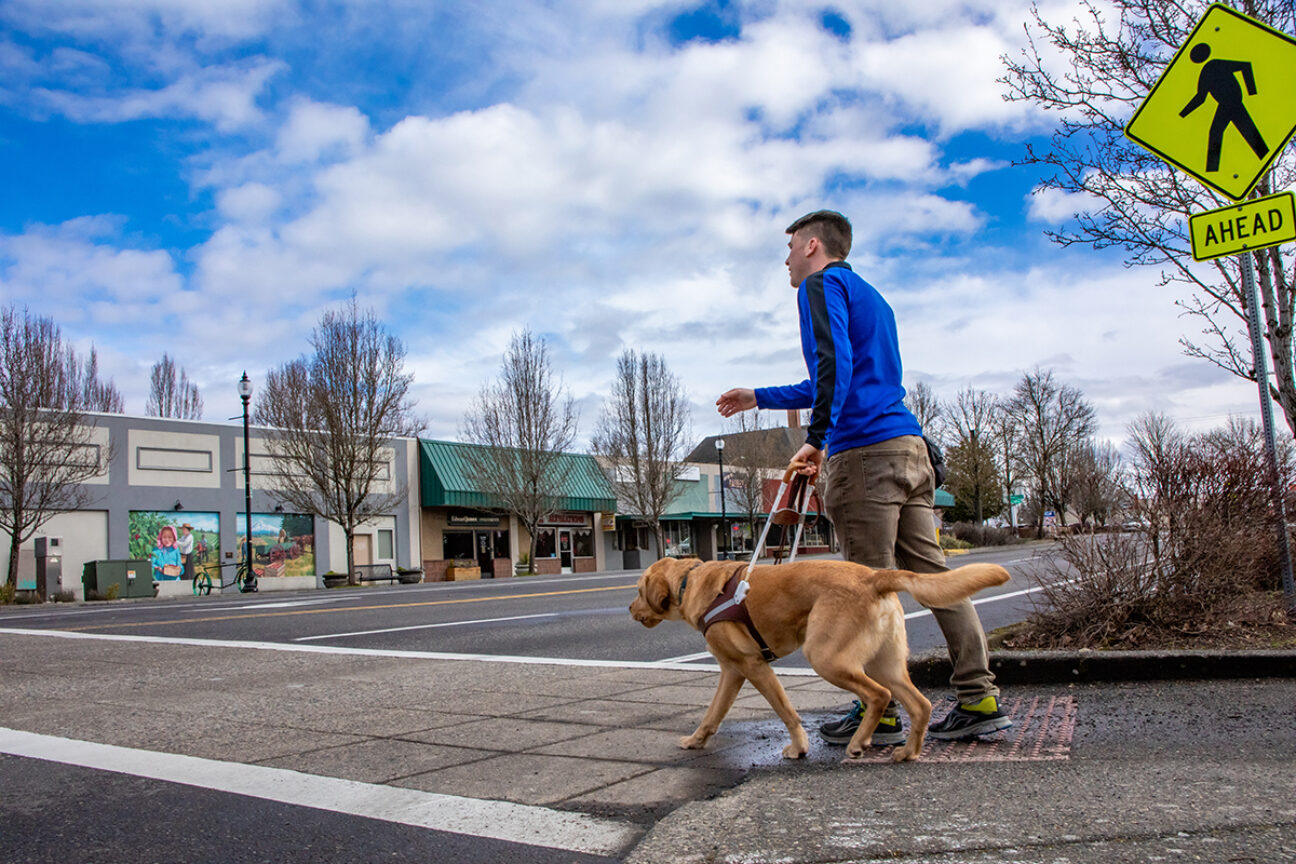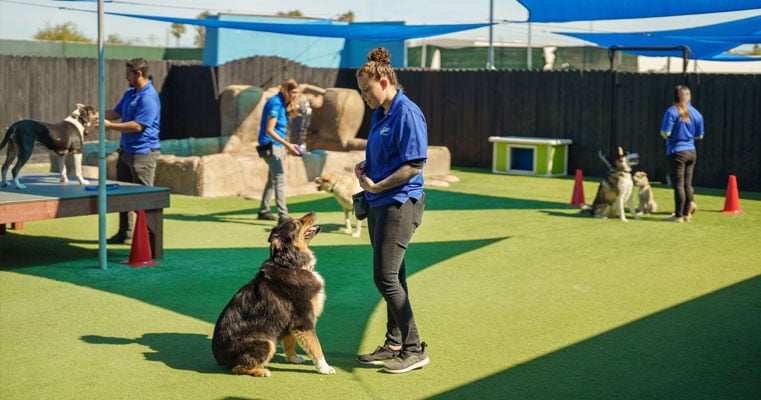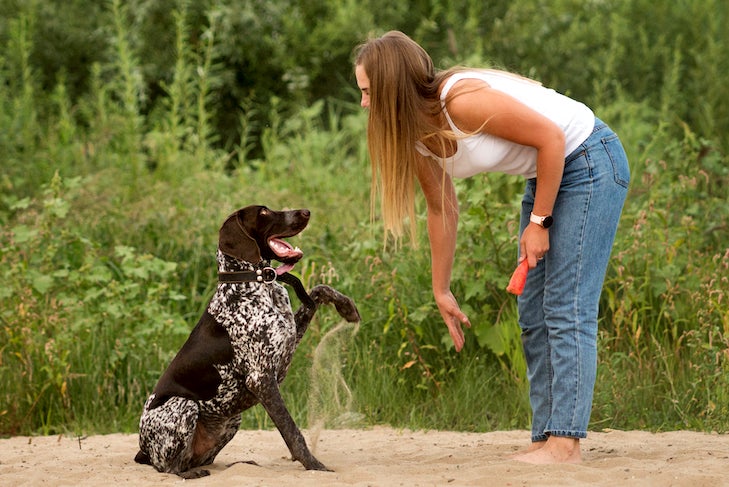Unlock Your Dog's Potential: Proven Pet Dog Training Approaches for Success
Effective pet dog training is a nuanced process that rests on comprehending canine habits and utilizing scientifically backed approaches. Dog training. By integrating positive support, developing clear commands, and prioritizing socializing, pet proprietors can grow an efficient partnership with their family pets. Challenges commonly emerge that call for customized services and an individual strategy. Exploring these shown methods exposes not only the possibility for behavior enhancement yet likewise the deeper bond that can be created in between proprietor and canine. What vital methods must be taken into consideration to absolutely open your pet dog's possibility?
Comprehending Pet Behavior
Comprehending dog habits is vital for efficient training and cultivating a positive relationship between canines and their owners. A thorough grasp of canine body language, articulations, and social interactions is critical for acknowledging their emotions and demands. Dogs communicate mainly with non-verbal cues; for instance, a wagging tail might indicate enjoyment, while pinned ears can indicate fear or submission.

In addition, ecological elements play a significant duty fit a canine's behavior. Adjustments in routine, new environments, or the visibility of strange individuals can lead to anxiety or anxiousness in canines. Acknowledging these triggers enables owners to alleviate negative responses and establish ideal training methods.
Inevitably, a deep understanding of pet dog behavior lays the structure for successful training techniques, boosting both behavior and the total bond in between the canine and its owner. Dog training. This understanding is essential for promoting a well-adjusted, delighted canine buddy
Favorable Reinforcement Strategies
Effective training depends heavily on favorable reinforcement techniques, which have actually been shown to produce significant outcomes in shaping desired actions in canines. This approach involves awarding a canine for showing specific behaviors, thereby increasing the likelihood that these behaviors will be repeated. Benefits can take different types, including deals with, praise, playthings, or playtime, relying on what motivates the individual canine.

It is necessary to progressively terminate benefits as the pet dog learns the behavior, transitioning to recurring reinforcement. This technique maintains the behavior over time while avoiding dependency on constant rewards. By concentrating on favorable reinforcement, instructors can grow a trusting relationship with their dogs, advertising a cooperative and healthy training environment that enhances overall obedience and performance.
Establishing Regular Commands
A basic element of successful dog training is the facility of constant commands. Consistency in commands is vital for efficient communication between the fitness instructor and the pet. When commands are uniform, pets discover to link particular words with preferred behaviors, which accelerates the training procedure and boosts understanding.
To develop constant commands, it is necessary that all member of the family utilize the very same terminology and gestures. If one individual makes use of "sit" while one more states "rest down," it can create complication for the dog. Select clear, distinctive words for commands and ensure everybody associated with the canine's training complies with these choices.
Furthermore, repeating is key. Reinforce commands via regular technique, guaranteeing that the dog gets adequate possibilities to respond appropriately. When a pet dog efficiently adheres to a command, immediate positive support must follow. This can be in the kind of deals with, praise, or playtime, strengthening the connection between the action and the command.
Finally, be individual. click to read more Establishing consistent commands takes time and initiative. With commitment and clarity, you will certainly help your pet create a solid understanding of expectations, inevitably leading to a mannerly companion.
Socialization and Exposure
Interacting socially a pet dog is vital for fostering a confident and well-adjusted friend. This procedure entails revealing your canine to a selection of environments, individuals, and other pets to establish their social skills and adaptability. Early socializing, ideally in between the ages of three to fourteen weeks, is important, as it prepares for a pet dog's future actions.
During socializing, aim to give positive experiences in various setups, such as parks, busy roads, and homes with other family pets. Introduce your canine to numerous stimulations, including noises, views, and scents, guaranteeing that each experience is gratifying. This direct exposure helps mitigate fear and stress and anxiety, leading the way for a more resilient canine.
Engaging in controlled team play sessions with various other pets can likewise boost social skills, educating your pet ideal interactions and limits. Constantly monitor your canine's comfort degree during these experiences, gradually raising direct exposure as their confidence expands. Bear in mind, the goal is to develop a well-shaped pet dog that thrives in varied circumstances, promoting a harmonious relationship with both people and other animals. Prioritizing socializing will substantially add to your pet's overall joy and habits throughout their life.
Conquering Common Training Obstacles

Canines might have a hard time to concentrate in active or strange setups. Gradually desensitize your pet to interruptions by beginning try these out training in a quiet atmosphere and gradually presenting more stimulations as they become skillful.
In addition, behavior concerns like jumping or extreme barking can become irritating. Address these by instructing alternate actions, such as sitting calmly when greeting guests. Consistency and persistence are important; strengthen desired behaviors regularly and avoid abuse, which can bring about confusion.
Last but not least, identify that each canine is special, and training timelines might differ. Dressmaker your approach to your dog's private requirements, and look for expert advice if needed. With determination and the best techniques, overcoming these obstacles can bring about a trained, pleased canine friend.
Verdict
In verdict, unlocking a canine's possible necessitates an extensive method that includes an understanding of canine habits, the application of positive support techniques, and the establishment of consistent commands. Early socialization and direct exposure to diverse atmospheres even more improve a dog's versatility and self-confidence. By resolving common training challenges with customized methods and persistence, a cooperative and unified relationship between canine and handler can be fostered, inevitably leading to a well-behaved buddy efficient in growing in numerous circumstances.
Effective dog training is a nuanced procedure that pivots on understanding canine habits and utilizing medically backed strategies.Understanding dog habits is essential pet scat mat for efficient training and cultivating a favorable relationship between dogs and their proprietors.Reliable training counts greatly on favorable reinforcement methods, which have been shown to yield significant outcomes in shaping desired actions in canines. When commands are uniform, pet dogs find out to connect certain words with desired habits, which speeds up the training process and enhances understanding.
In verdict, opening a dog's potential requires a comprehensive method that includes an understanding of canine behavior, the application of positive reinforcement strategies, and the facility of regular commands.